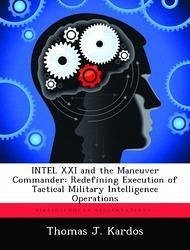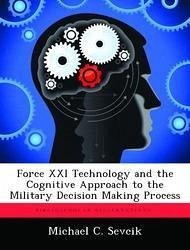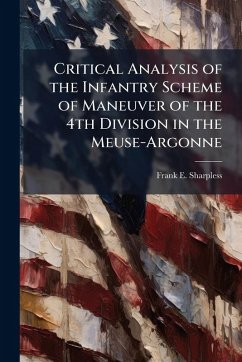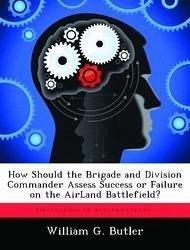
INTEL XXI and the Maneuver Commander
Redefining Execution of Tactical Military Intelligence Operations
Versandkostenfrei!
Versandfertig in über 4 Wochen
15,99 €
inkl. MwSt.

PAYBACK Punkte
8 °P sammeln!
The military's response to changes within the world political and technological environment has been termed a Revolution in Military Affairs (RMA). This monograph summarizes the effects that these changes will have on intelligence operations at the tactical level, or more specifically, the interaction between the tactical commander and the intelligence system which supports him. Though the definition of RMA varies from source to source, it can be distilled to the cumulative effects brought about by the progress of technology, doctrine, organization, and behavior. Recognition that the military ...
The military's response to changes within the world political and technological environment has been termed a Revolution in Military Affairs (RMA). This monograph summarizes the effects that these changes will have on intelligence operations at the tactical level, or more specifically, the interaction between the tactical commander and the intelligence system which supports him. Though the definition of RMA varies from source to source, it can be distilled to the cumulative effects brought about by the progress of technology, doctrine, organization, and behavior. Recognition that the military is amidst the throes of a Revolution in Military Affairs is not sufficient to produce necessary and meaningful change. A strategy is needed in order to chart the Army's course for the near future and beyond. This concept is formulated in Army programs and has come to be known as "Force XXI". Concurrently, the Military Intelligence community is drafting its own, complementary program: "Intelligence XXI" - "INTEL XXI". An brief historical overview is presented in Section 2. A summary of the characteristics of future forces and operations as envisioned by the Force XXI and INTEL XXI programs is found in Section 3. The impact of these programs for tactical intelligence operations is discussed in Sections 4 through 7. The implications of these concepts is framed in terms of their impact on the TRADOC domains - Doctrine; Leadership; Organization (and Manning); and Training. Finally, a summary of what has been construed and recommendations are contained in the Conclusion. Whether the changes encompassed within the INTEL XXI concept actually signal a revolution in military affairs could be debated. Many changes have been proposed and experimented with in the past. Perhaps this revolution will not be gauged by the extent of the proposals, but rather by the degree to which commanders and intelligence operators and analysts maximize the potential of these evolving concepts. The length an This work has been selected by scholars as being culturally important, and is part of the knowledge base of civilization as we know it. This work was reproduced from the original artifact, and remains as true to the original work as possible. Therefore, you will see the original copyright references, library stamps (as most of these works have been housed in our most important libraries around the world), and other notations in the work. This work is in the public domain in the United States of America, and possibly other nations. Within the United States, you may freely copy and distribute this work, as no entity (individual or corporate) has a copyright on the body of the work. As a reproduction of a historical artifact, this work may contain missing or blurred pages, poor pictures, errant marks, etc. Scholars believe, and we concur, that this work is important enough to be preserved, reproduced, and made generally available to the public. We appreciate your support of the preservation process, and thank you for being an important part of keeping this knowledge alive and relevant.












